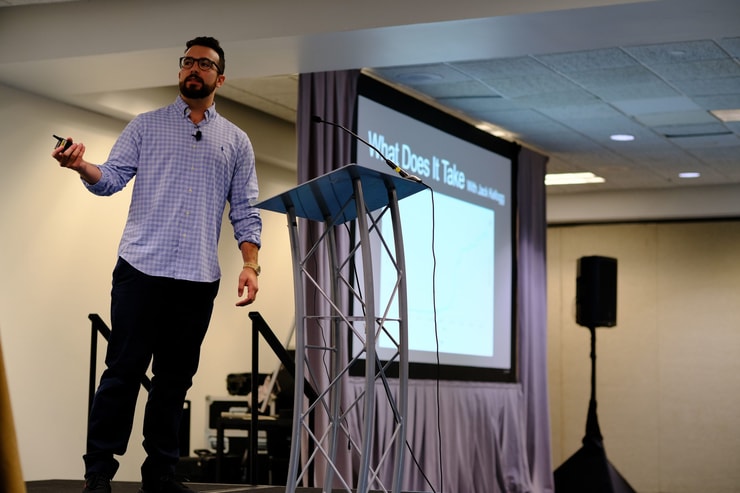Imagine one moment you’re a valet driver in a small town…
Three years later, you’re a multi-millionaire trader
While it sounds almost too good to be true, it happened for Jack Kellog.
How was he able to make the quantum leap, and what can you take from his story to help you along your journey?
Believe it or not, it has less to do with trading strategies or your starting account size.
On his way to earning more than $10 million, Jack made plenty of mistakes.
Last October, Jack spoke at our Traders Conference in Miami about what it takes to become a successful trader.

2025 Millionaire Media, LLCFor him, a guy who went from a valet to one of my most successful students, it started with developing an unbeatable mindset.
The lessons he covered are so POWERFUL that I believe you can apply them instantly.
You see, mistakes will happen.
So will losing trades.
But how you handle them is what sets great traders apart from the rest of the pack.
Face Your Fears

2025 Millionaire Media, LLCIn 2017, I asked Jack to speak at the trading conference that year.
He had just become reasonably profitable, but was nervous about speaking on stage.
This year Jack revealed his fears over the years:
- Fear of the unknown
- Fear of giving back profits
- Fear of sizing up
- FOMO
Fear is healthy. Your mind wants to keep you out of trouble.
Listen to it, but don’t let it own you.
It’s tough, but successful traders work with their fears.
First, they identify them. Then they accept them. Finally, they work through them.
The process is the same but the journey is different for everyone.
Self-Belief
The general public tends not to hold a favorable opinion of day traders.
I hear countless stories of folks put down by their friends and family, telling them it’s a waste of time and money.
At the end of the day, trading is between you and yourself.
You need to be able to motivate, focus, and manage yourself.
As Jack pointed out, networking at events such as the conference is a great way to do this.
More Breaking News
- MARA Stock Surges: What’s Fueling the Momentum?
- Core Scientific Unexpected Surge: Could Acquisition Boost Growth?
- Reddit’s Recent Roller Coaster: What’s Next?
With a group of like-minded traders on the same journey, you can lean on one another for support and prop each other up.
Losses
Jack’s got to where he is today because of his losses.
Losses can either own you, or you can own the losses.
In my mind, he has one of the BEST mindsets out there.
Instead of wallowing in losses, Jack reviews every single one.
None of them are wasted and he uses many for quick inspiration.
For example, Jack took some sizable losses in AMTD Digital Inc. (NYSE: HKD) and Intelligent Living Application Group Inc. (NASDAQ: ILAG) this year.
Rather than get down on himself, Jack looked into the trades and discovered they showed bad volume near the trade, and his size was too big.
Nothing will improve your trading faster than a trading journal.
Honestly assessing your trades, good and bad, regularly and objectively will help you uncover problems and find opportunities.
Bear Market Trading

2025 Millionaire Media, LLC2021 was a GREAT year for trading.
2022…not so much.
We take what the market gives us, not the other way around.
You can expect strategies to work the same way in bear markets as they do in bull markets.
Adjustments are needed.
Jack recognized the extra risk and began locking in profits quicker this year.
He reduced his position size and leaned more on the first hour of trading to avoid getting chopped up.
More importantly, he’s not forcing trades, which frees him up to take more vacations, study, and learn new ideas.
A Motto to Live By
Jack’s parting words are ones to live by.
Trade to live, don’t live to trade.
Study hard. But make sure to have fun.
—Tim








Leave a reply